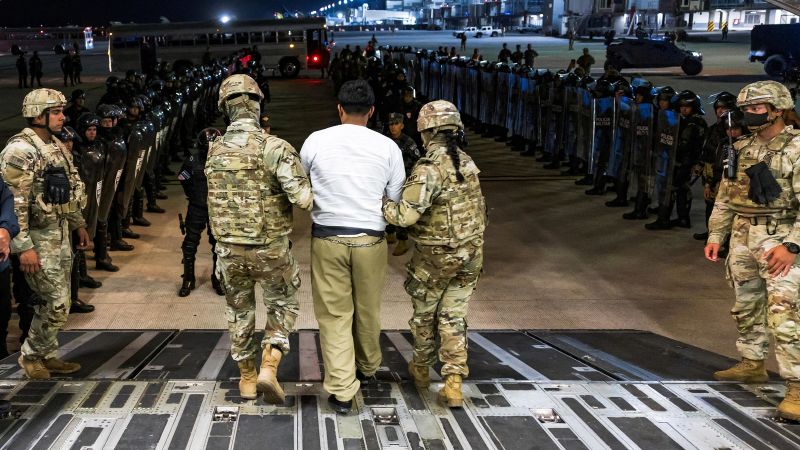The recent proposed U.S. arrangement to deport Venezuelan migrants with alleged connections to the Tren de Aragua gang to El Salvador has garnered significant attention. This diplomatic initiative, which involves sending up to 500 migrants to be housed within the notorious Terrorism Confinement Center (CECOT) in El Salvador, marks an unprecedented collaboration between the two governments. Highlighted in recent email disclosures, this initiative reveals the intricacies of the Trump administration’s negotiations with El Salvador, particularly under President Nayib Bukele’s leadership.
Initially, El Salvador’s government indicated its willingness to accept approximately 300 migrants by mid-March. An internal document elucidated that this agreement was characterized as a “cooperation agreement” of a friendly and non-binding nature. Nonetheless, U.S. officials insisted that while 500 individuals might be the ideal number, the true figure remained flexible and subject to ongoing negotiations.
President Donald Trump expressed admiration for Bukele, commending his administration’s efforts against crime in El Salvador, particularly referencing the violent history of the inmates housed at CECOT. The nature of the discussions might suggest a unique coalition wherein El Salvador was being positioned as a vital ally of American immigration policy. However, the logistics of deporting Venezuelan migrants sparked intense legal scrutiny and backlash, especially from immigrant advocates and Democratic lawmakers who voiced concerns regarding human rights implications and the threat of unjust deportations based on dubious claims.
Prior to these deportations, the U.S. had established a funding plan, approving $15 million to support El Salvador’s efforts to curb gang violence and manage the incoming migrants. Reports indicated that nearly $5 million had already been allocated, mainly in the form of a grant intended for law enforcement and correctional facilities. Importantly, the reimbursement per deported individual further showcased the financial frameworks entwined in this relationship, reflecting an ongoing dialogue about accountability in managing these migrant populations.
U.S. officials and their Salvadoran counterparts have exchanged messages detailing the terms surrounding this arrangement. With emails between Bukele’s brother, Ibrajim Bukele, and senior U.S. State Department officials elucidating intricate details, the proposed costs per migrant deported to CECOT approached $20,000, factoring in transportation and other logistical arrangements. Additionally, the dialogue alluded to potential future cooperation and further opportunities for mutual support in addressing regional security issues.
Discussions conducted between regional officials emphasized the prioritization of deporting members of the MS-13 gang, indicating a broader strategy while simultaneously limiting the terms to only certain individuals connected to Tren de Aragua. Negotiations considered not only the logistics but also the treatment of the migrants, ensuring that conditions would align with recognized international norms. While the initial focus remained on these 500 individuals, broader concerns lingered regarding the future implications of transforming El Salvador into a hub for U.S. deportations, particularly concerning the ethical considerations surrounding human rights violations.
A turning point came just before the first wave of flights, as El Salvador officially committed to accepting 300 members of Tren de Aragua along with two alleged MS-13 operatives. This arrangement received formal endorsement from U.S. officials, asserting that the cooperation was fundamentally rooted in addressing illegal immigration, human trafficking, and the various exploitation concerns emerging in the region.
These developments reflect a comprehensive strategy tied to broader U.S. immigration and foreign policy objectives. The U.S. has indicated a commitment to equipping regional partners like El Salvador to effectively manage their borders while simultaneously addressing the pressing issues of crime, human trafficking, and illegal immigration. In the Oval Office meeting between Trump and Bukele, the vision for expanding El Salvador’s capacity to handle deportees was underscored, signaling that the notion of constructing additional mega-prisons was on the administration’s agenda.
Contentions emerged, however, with federal judges and legal experts expressing concerns regarding the treatment of deportees sent to these facilities, with specific criticisms leveled at potential human rights violations. The legal battles surrounding this context demonstrate the complexities involved in enforcing immigration laws while maintaining adherence to the foundational tenets of human rights and due process. The judicial pushback highlighted a growing apprehension about deportation practices that could lead to treatment in prisons unrecognizable in the U.S. judicial system, stirring significant legal and moral debates.
In conclusion, the ongoing negotiations and the reported deployment of Venezuelan migrants to El Salvador represent a multifaceted chapter in U.S. immigration policy. It unveils not only the extents of diplomatic collaborations but also underscores the ethical challenges and legal complexities that arise from using foreign detention facilities.



